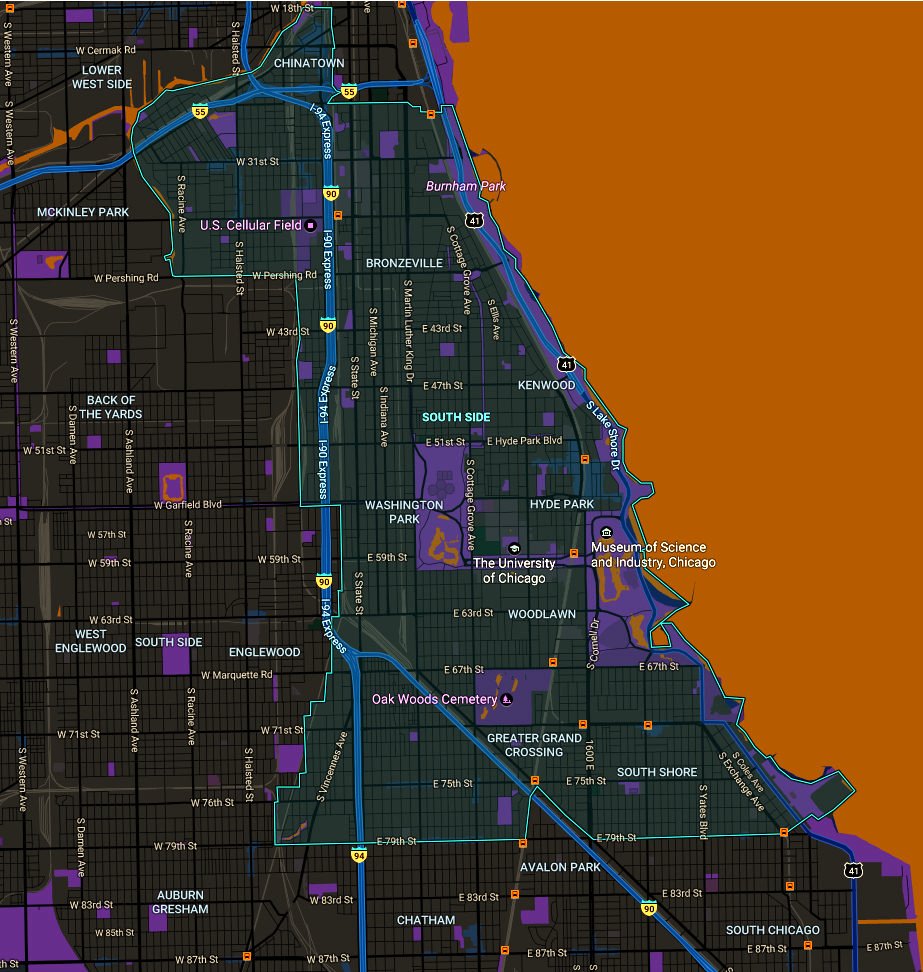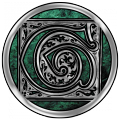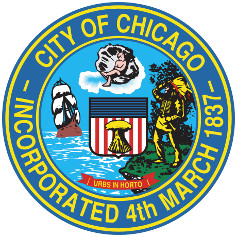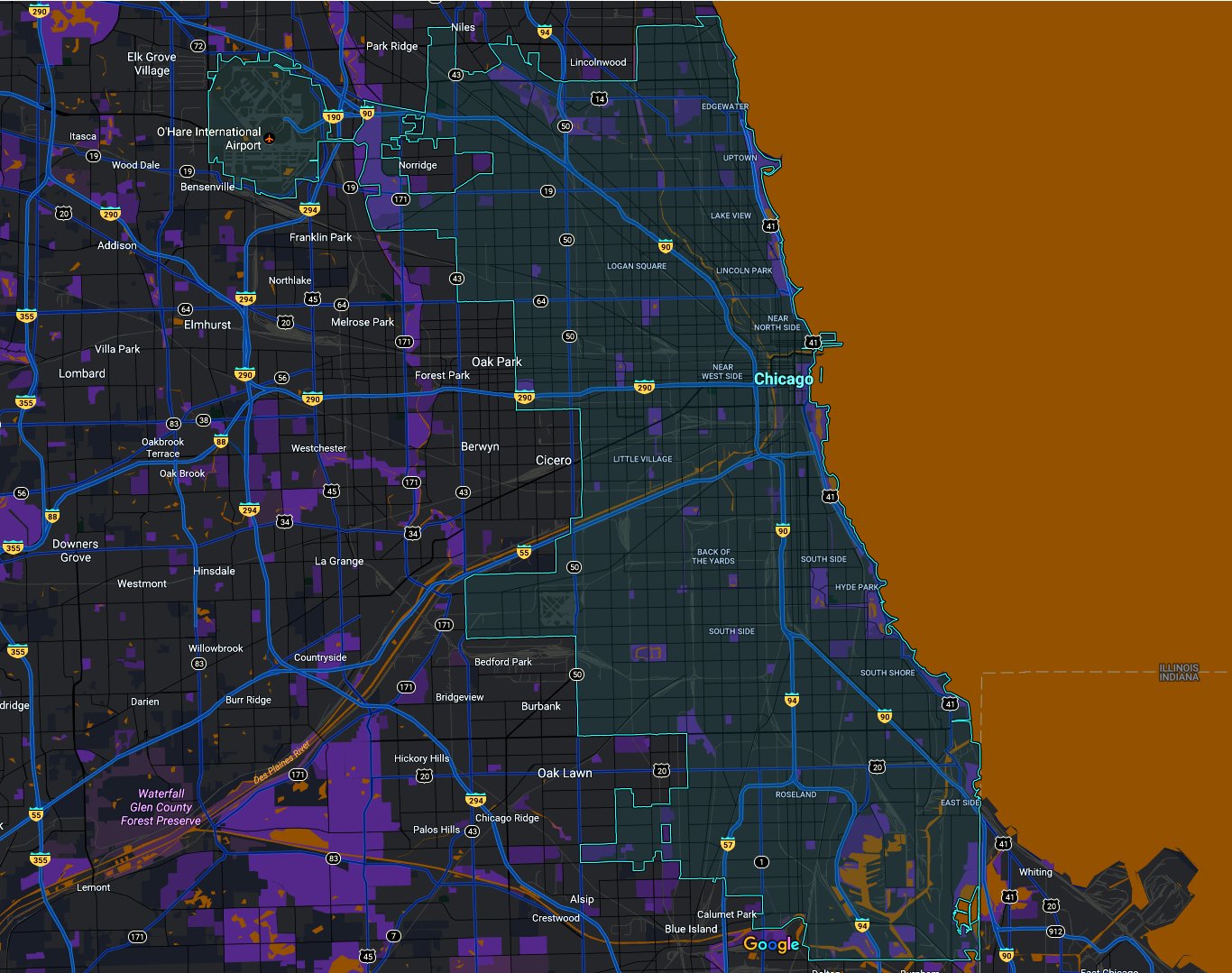Chicago
Contents
- 1 Chicago by Day
- 2 Quote
- 3 Chicago after Dark
- 4 City Device
- 5 Climate
- 6 Demonym
- 7 Districts
- 8 Economy
- 9 History
- 9.1 Introduction
- 9.1.1 Original Native Settlements
- 9.1.2 European Arrival
- 9.1.3 Birth of a City
- 9.1.4 Boom Town to Transportation Hub
- 9.1.5 The 19th Century and the Growth of Immigration
- 9.1.6 The Gilded Age of Chicago
- 9.1.7 A City of Commerce and Industry
- 9.1.8 The Political History of Chicago
- 9.1.9 The Great Migrations of the 20th Century
- 9.1.10 The Rise of Labor Unions
- 9.1.11 World War II
- 9.1.12 Post World War II
- 9.1.13 Politics and the Turn of the 21st Century
- 9.1 Introduction
- 10 Location
- 11 Population
- 12 Arenas
- 13 Attractions
- 14 Bars and Clubs
- 15 Cemeteries
- 16 City Government
- 17 Crime
- 18 Citizens of the City
- 19 Current Events
- 20 Galleries
- 21 Holy Ground
- 22 Hospitals
- 23 Hotels & Motels
- 24 Landmarks
- 25 Law Enforcement
- 26 Mass Media
- 27 Monuments
- 28 Museums
- 29 Parks
- 30 Private Residences
- 31 Restaurants
- 32 Ruins
- 33 Schools
- 34 Shops
- 35 Theaters
- 36 Transportation
- 37 Supernaturals of Chicago
- 38 Websites
- 39 Sources
Chicago by Day
Quote
At Death's Own Wake...
Chicago, favored city of the Damned, is not as it once was. The streets, which have tasted blood time and time again, feasted as never before during the attack of the savage werewolves. Decades of effort fell in less than a month. That which had been immortal is no more. Crowning this pile of despair is the torn corpse of the prince, the last vestige of immortality ripped out by red-stained claws.
The Dead Can Dance!
The city has become a swirling vortex, pulling in fresh victims from every direction. From across the world the undead swarm, drawn in by Chicago's suffering. Who can resist its desperate call?
Chicago after Dark
City Device
Climate
The city lies within the humid continental climate zone, and experiences four distinct seasons. Summers are warm to hot and often humid, with a July daily average of 75.8 °F (24.3 °C). In a normal summer, temperatures can exceed 90 °F (32 °C) as many as 21 days. Winters are cold and snowy with few sunny days, and the normal January high is just below freezing. Spring and autumn are mild seasons with low humidity. Dewpoint temperatures in the summer range from 55.7 °F (13.2 °C) in June to 61.7 °F (16.5 °C) in July. The city is part of the USDA Plant Hardiness zone 6a, transitioning to 5b in the suburbs.
According to the National Weather Service, Chicago's highest official temperature reading of 105 °F (41 °C) was recorded on July 24, 1934, although Midway Airport reached 109 °F (43 °C) one day prior and recorded a heat index of 125 °F (52 °C) during the 1995 heatwave. The lowest official temperature of −27 °F (−33 °C) was recorded on January 20, 1985, at O'Hare Airport. The city can experience extreme winter cold waves and summer heat waves that may last for several consecutive days. Thunderstorms are common during the spring and summer months which may sometimes produce hail, high winds, and tornadoes. Like other major cities, Chicago also experiences urban heat island, making the city and its suburbs milder than surrounding rural areas, especially at night and in winter. Also, the proximity to Lake Michigan keeps lakefront Chicago cooler in early summer and milder in winter than areas to the west.
Demonym
Chicagoan
Districts
Introduction to the Neighborhoods of Chicago
the bowels of the Devil
let me tell you what the sucka eats
its stomach is filled with lost souls
guts made out of steel and concrete.
-- Body Count, "Bowels of the Devil"
Down Town
East Side
South Side

The South Side is the largest section of the city, encompassing roughly 60% of the city's land area, and much was annexed in the late 19th century. The section along the lake is marked with public parkland and beaches. The South Side has a higher ratio of single-family homes and also contains most of the city's remaining industry. Historically it was the location of the stockyards, and its industries attracted hundreds of thousands of European immigrants and African-American migrants in the late 19th and early 20th centuries. More recent immigrants have come from Mexico and Latin America. The Chicago White Sox have played at three different stadiums in the area since 1900—first South Side Park (1900–1910), then the original Comiskey Park (1910–1990), and finally their current home, originally named Comiskey Park but now known as U.S. Cellular Field (1991–present).
Along with being the largest section of the city in terms of geography, the South Side is also home to one of the city's largest parades: the annual Bud Billiken Day parade. Held during the second weekend of August, it celebrates children returning to school.
The South Side has two of Chicago's largest public parks. Jackson Park, which hosted the World's Columbian Exposition in 1893, is the site of the Museum of Science and Industry. The park stretches along the waterfront, situated between the neighborhoods of Hyde Park and South Shore. Washington Park sits slightly west of Jackson Park and the two are connected by a strip of parkland known as Midway Plaisance, which runs parallel to the University of Chicago.
Community Areas
- -- Armour Square -- is a Chicago neighborhood on the city's South Side, as well as a larger, officially defined community area which also includes Chinatown and the CHA Wentworth Gardens housing project. Armour Square is bordered by Bridgeport to the west and Bronzeville to the east, with Pilsen and the near South Side bordering the area to the north and Fuller Park bordering its southernmost boundary along Pershing Road.
Neighborhoods
- -- Bronzeville -- is a neighborhood in the Douglas and Grand Boulevard community areas on the South Side of Chicago around the Illinois Institute of Technology, VanderCook College of Music, and Illinois College of Optometry. It is accessible via the Green and Red lines of the Chicago Transit Authority, as well as the Metra Electric District Main Line.
- -- Legends South -- is a mixed-income housing development located in the Bronzeville neighborhood of the South Side of Chicago. It will include nearly 2,400 new mixed-income rental and home ownership units. In 1996 HOPE VI funds were granted specifically for Legends South to replace the infamous Robert Taylor Homes.
Near South Side
West Side
North Side
The Outlands
Specific Locations
The Suburbs
Gary, Indiana
Economy
History
"They only dimly recalled the things they had lost and refused to believe that there had been a time when they were pure and happy." -- Fyoder Dostoyevsky, The Dream of a Ridiculous Man
Chicago has earned itself a host of colorful sobriquets during its short but illustrious history. Young by European standards, the city has become known as "Gangsterland", "Hog Butcher" and the "Windy City", among other names. Its political machine has long been one of the most powerful in the country, manipulating politics even at a national level. However, none of these images tell the whole story about one of America's most intriguing municipalities. The truth is concealed in the unlives of the Kindred who control this city, and who have manipulated its history from its very first days.
Introduction
The history of Chicago, Illinois, has played a central role in American economic, social, cultural and political history and since the 1850s has been the dominant Midwest metropolis. The area's recorded history begins with the arrival of French explorers, missionaries and fur traders in the late 17th century and their interaction with the local Potawatomi Indians. There were small settlements and a U.S. Army fort, but the soldiers and settlers were all driven off in 1812. The modern city was incorporated in 1837 by Northern businessmen and grew rapidly from real estate speculation and the realization that it had a commanding position in the emerging inland transportation network, based on lake traffic and railroads, controlling access from the Great Lakes into the Mississippi River basin. Despite a fire in 1871 that destroyed the central business district, the city grew exponentially, becoming the nation's rail center and the dominant Midwestern center for manufacturing, commerce, finance, higher education, religion, broadcasting, sports, jazz, and high culture. The city was a magnet for European immigrants—at first Germans, Irish and Scandinavians, then from the 1890s to 1914, Jews, Czechs, Poles and Italians. They were all absorbed in the city's powerful ward-based political machines. Many joined militant labor unions, and Chicago became notorious for its violent strikes, and high wages. Large amounts of African Americans migrated from the South in starting in the World War I era as part of the Great Migration. Mexicans started arriving after 1910, and Puerto Ricans after 1945. The Cook County suburbs grew rapidly after 1945, but the Democratic party machine kept both the city and suburbs under control, especially under mayor Richard J. Daley, who was chairman of the Cook County Democratic Party. Deindustrialization after 1970 closed the stockyards and most of the steel mills and factories, but the city retained its role as a financial and transportation hub. Increasingly it emphasized its service roles in medicine, higher education and tourism. The city formed the political base for national leaders of the Democratic Party, especially Stephen A. Douglas in the 1850s, Adlai Stevenson in the 1950s, and Barack Obama in recent years.
Original Native Settlements
At its first appearance in records by explorers, the Chicago area was inhabited by a number of Algonquian peoples, including the Mascouten and Miami. The name "Chicago" is derived from a French rendering of the Native American word shikaakwa, known to botanists as Allium tricoccum, from the Miami-Illinois language. The first known reference to the site of the current city of Chicago as "Checagou" was by Robert de LaSalle around 1679 in a memoir. Henri Joutel, in his journal of 1688, noted that the wild garlic, called "chicagoua", grew abundantly in the area. According to his diary of late September 1687: "when we arrived at the said place called Chicagou which, according to what we were able to learn of it, has taken this name because of the quantity of garlic which grows in the forests in this region."
The tribe was part of the Miami Confederacy, which included the Illini and Kickapoo. In 1671, Potawatomi guides first took the French trader Nicolas Perrot to the Miami villages near the site of present-day Chicago. Pierre François Xavier de Charlevoix would write in 1721 that the Miami had a settlement in what is now Chicago around 1670. Chicago's location at a short canoe portage (the Chicago Portage) connecting the Great Lakes with the Mississippi River system attracted the attention of many French explorers, notably Louis Jolliet and Jacques Marquette in 1673. The Jesuit Relations indicate that by this time, the Iroquois tribes of New York had driven the Algonquian tribes entirely out of Lower Michigan and as far as this portage, during the later Beaver Wars.
René-Robert Cavelier, Sieur de La Salle, who traversed the Kankakee and Illinois Rivers south of Chicago in the winter of 1681–82, identified the Des Plaines River as the western boundary of the Miami. In 1683, La Salle built Fort St. Louis on the Illinois River. Almost two thousand Miami, including Weas and Piankeshaws, left the Chicago area to gather on the opposite shore at the Grand Village of the Illinois, seeking French protection from the Iroquois. In 1696, French Jesuits led by Jean-François Buisson de Saint-Cosme built the Mission of the Guardian Angel to Christianize the local Wea and Miami people. Shortly thereafter, Augustin le Gardeur de Courtemanche visited the settlement on behalf of the French government, seeking peace between the Miami and Iroquois. Miami chief Chichikatalo accompanied de Courtemanche to Montreal.
The Algonquian tribes began to retake the lost territory in the ensuing decades, and in 1701 the Iroquois formally abandoned their claim to their "hunting grounds" as far as the portage to England in the Nanfan Treaty, which was finally ratified in 1726. This was largely a political maneuver of little practicality, as the English then had no presence in the region whatsoever, the French and their Algonquian allies being the dominant force in the area. A writer in 1718 noted at the Was had a village in Chicago, but had recently fled due to concerns about approaching Ojibwes and Pottawatomis. The Iroquois and Meskwaki probably drove out all Miami from the Chicago area by the end of the 1720s. The Pottawatomi assumed control of the area, but probably did not have any major settlements in Chicago. French and allied use of the Chicago portage was mostly abandoned during the 1720s because of continual Native American raids during the Fox Wars.
European Arrival
The first settler in Chicago was Jean Baptiste Point du Sable who built a farm at the mouth of the Chicago River in the 1780s. He left Chicago in 1800. In 1968, Point du Sable was honored at Pioneer Court as the city's founder and featured as a symbol.
In 1795, following the Northwest Indian War, some Native Americans ceded the area of Chicago to the United States for a military post in the Treaty of Greenville. The US built Fort Dearborn in 1803 on the Chicago River. It was destroyed by Indian forces during the War of 1812 in the Battle of Fort Dearborn, and many of the inhabitants were killed or taken prisoner. The fort had been ordered to evacuate. During the evacuation soldiers and civilians were overtaken near what is today Prairie Avenue. After the end of the war, the Potawatomi ceded the land to the United States in the 1816 Treaty of St. Louis. (Today, this treaty is commemorated in Indian Boundary Park.) Fort Dearborn was rebuilt in 1818 and used until 1837.
Birth of a City
n 1829, the Illinois legislature appointed commissioners to locate a canal and lay out the surrounding town. The commissioners employed James Thompson to survey and plat the town of Chicago, which at the time had a population of less than 100. Historians regard the August 4, 1830 filing of the plat as the official recognition of a location known as Chicago.
Yankee entrepreneurs saw the potential of Chicago as a transportation hub in the 1830s, and engaged in land speculation to obtain the choicest lots. On August 12, 1833, the Town of Chicago was incorporated with a population of 350. On July 12, 1834, the Illinois from Sackets Harbor, New York was the first commercial schooner to enter the harbor, a sign of the Great Lakes trade that would benefit both Chicago and New York state. Chicago was granted a city charter by the State of Illinois on March 4, 1837; it was part of the larger Cook County. By 1840 the boom town had a population of over 4,000.
After 1830, the rich farmlands of northern Illinois attracted Yankee settlers. Yankee real estate operators created a city overnight in the 1830s. To open the surrounding farmlands to trade, the Cook County commissioners built roads south and west; the latter crossed the "dismal Nine-mile Swamp," the Des Plaines River, and went southwest to Walker's Grove, now the Village of Plainfield. The roads enabled hundreds of wagons per day of farm produce to arrive, so the entrepreneurs built grain elevators and docks to load ships bound for points east through the Great Lakes. Produce was shipped through the Erie Canal and down the Hudson River to New York City; the growth of the Midwest farms expanded New York City as a port.
Boom Town to Transportation Hub
In 1848, the opening of the Illinois and Michigan Canal allowed shipping from the Great Lakes through Chicago to the Mississippi River and the Gulf of Mexico. The first rail line to Chicago, the Galena & Chicago Union Railroad was completed the same year. Chicago would go on to become the transportation hub of the United States with its road, rail, water and later air connections. Chicago also became home to national retailers offering catalog shopping such as Montgomery Ward and Sears, Roebuck and Company, which used the transportation lines to ship all over the nation. By the 1850s, the construction of railroads made Chicago a major hub; over 30 lines entered the city. The main lines from the East ended in Chicago, and those oriented to the West began in Chicago, so by 1860 the city became the nation's trans-shipment and warehousing center. Factories were created, most famously the harvester factory opened in 1847 by Cyrus Hall McCormick. It was a processing center for natural resource commodities extracted in the West. The Wisconsin forests supported the millwork and lumber business; the Illinois hinterland provided the wheat. Hundreds of thousands of hogs and cattle were shipped to Chicago for slaughter, preserving in salt, and transport to eastern markets. By 1870 refrigerated cars allowed the shipping of fresh meat to eastern cities. The prairie bog nature of the area provided a fertile ground for disease-carrying insects. In springtime Chicago was so muddy from the high water that horses could scarcely move. Comical signs proclaiming "Fastest route to China" or "No Bottom Here" were placed to warn people of the mud.
Travelers reported Chicago was the filthiest city in America. The city created a massive sewer system. In the first phase, sewage pipes were laid across the city above ground, to use gravity to move the waste. The city was built in a low-lying area subject to flooding. In 1856 the city council decided that the entire city should be elevated four to five feet by using a newly available jacking-up process. In one instance, the 5-story Brigg’s Hotel, weighing 22,000 tons, was lifted while it continued to operate. Observing that such a thing could never have happened in Europe, the British historian Paul Johnson cites this astounding feat as a dramatic example of American determination and ingenuity: based on the conviction that anything material is possible.
The 19th Century and the Growth of Immigration
Although originally settled by Yankees in the 1830s, in the 1840s many Irish Catholics came to the city as a result of the Great Famine. Later in the century, the railroads, stockyards and other heavy industry of the late 19th century attracted a variety of skilled workers from Europe, especially Germans, English, Swedes, Norwegians and Dutch.
In 1840, Chicago was the ninety-second most populous city in the United States. Its population grew so rapidly that twenty years later, it was the ninth most populous city in the country. In the pivotal year of 1848, Chicago saw the completion of the Illinois and Michigan Canal, its first steam locomotives, the introduction of steam-powered grain elevators, the arrival of the telegraph, and the founding of the Chicago Board of Trade. By 1870 Chicago had grown to become the nation's second largest city, and one of the largest cities in the world. By 1857 Chicago was the largest city in what was then known as the Northwest. In a period of twenty years Chicago grew from 4,000 people to over 90,000.
Chicago surpassed St. Louis and Cincinnati as the major city in the West. It gained political notice as the home of Stephen Douglas, the 1860 presidential nominee of the Northern Democrats. The 1860 Republican National Convention in Chicago nominated home-state candidate Abraham Lincoln. The city government and voluntary societies gave generous support to soldiers during the war.
Many of the newcomers were Irish Catholic and German immigrants. Their neighborhood saloons, a center of male social life, were criticized in the mid-1850s by the local Know-Nothing Party, which drew its strength from eastern Protestants. The new party was anti-immigration and anti-liquor, and called for the purification of politics by reducing the power of the saloonkeepers. In 1855, the Know Nothings elected Levi Boone mayor, who banned Sunday sales of liquor and beer. His aggressive law enforcement sparked the Lager Beer Riot of April 1855, which erupted outside a courthouse where eight Germans were being tried for liquor ordinance violations. After the American Civil War, saloons became community centers only for local ethnic men, as reformers saw them as places that incited riotous behavior and moral decay.
Between 1870 and 1900 Chicago grew from a city of 299,000 to nearly 1.7 million, at the time the fastest-growing city ever. Chicago's flourishing economy attracted huge numbers of new immigrants from Europe and migrants from the eastern states. Relatively few new arrivals came from Chicago's rural hinterland.
The Gilded Age of Chicago
In 1871, most of the city burned in the Great Chicago Fire. The damage from the fire was immense; 300 people died, 18,000 buildings were destroyed and nearly 100,000 of the city's 300,000 residents were left homeless. One of the factors contributing to the fire's spread was the abundance of wood; the streets, sidewalks and many buildings were built of wood. The fire led to the incorporation of stringent fire-safety codes that included a strong preference for masonry construction.
Danish immigrant Jens Jensen arrived in 1886 and soon became a highly successful and celebrated landscape designer. Jensen's work was characterized by a democratic approach to landscaping, informed by his interest in social justice and conservation, and his rejection of anti-democratic formalism. Among Jensen's creations were four Chicago city parks, most famously Columbus Park. His work also included garden design for some of the region's most influential millionaires. The World's Columbian Exposition of 1893 was constructed on former wetlands at the present location of Jackson Park along Lake Michigan in Chicago's Hyde Park neighborhood. The land was reclaimed according to a design by landscape architect Frederick Law Olmsted. The temporary pavilions, which followed a classical theme, were designed by a committee of the city's architects under the direction of Daniel Burnham. It was called the "White City" for the appearance of its buildings.
The Exposition drew 27.5 million visitors, and is considered among the most influential world's fairs in history, affecting art, architecture and design throughout the nation.[21] The classical architectural style contributed to a revival of Beaux Arts architecture that borrowed from historical styles, although Chicago was also developing the original skyscraper and organic forms based in new technologies. The fair featured the first, and until recently, largest Ferris wheel ever built.
The soft, swampy ground near the lake proved unstable ground for tall masonry buildings. While this was an early constraint, builders developed the innovative use of steel framing for support and invented the skyscraper in Chicago. The city became a leader in modern architecture and set the model nationwide for achieving vertical city densities.
Developers and citizens began immediate reconstruction on the existing Jeffersonian grid. The building boom that followed saved the city's status as the transportation and trade hub of the Midwest. Massive reconstruction using the newest materials and methods catapulted Chicago into its status as a city on par with New York. It became the birthplace of modern architecture in the United States.
A City of Commerce and Industry
Chicago, after New York City, became the center of the nation's advertising industry. Albert Lasker, known as the "father of modern advertising" made Chicago his base 1898-1942. As head of the Lord and Thomas agency, Lasker devised a copywriting technique that appealed directly to the psychology of the consumer. Women seldom smoked cigarettes; he told them if they smoked Lucky Strikes they could stay slender. Lasker's use of radio, particularly with his campaigns for Palmolive soap, Pepsodent toothpaste, Kotex products, and Lucky Strike cigarettes, not only revolutionized the advertising industry but significantly changed popular culture.
Chicago's manufacturing and retail sectors, fostered by the expansion of railroads throughout the upper Midwest and East, grew rapidly and came to dominate the Midwest and greatly influence the nation's economy. The Chicago Union Stock Yards dominated the packing trade. Chicago became the world's largest rail hub, and one of its busiest ports by shipping traffic on the Great Lakes. Commodity resources, such as lumber, iron and coal, were brought to Chicago and Ohio for processing, with products shipped both East and West to support new growth.
Lake Michigan — the primary source of fresh water for the city — became polluted from the rapidly growing industries in and around Chicago; a new way of procuring clean water was needed. In 1885 the civil engineer Lyman Edgar Cooley proposed the Chicago Sanitary and Ship Canal. He envisioned a deep waterway that would dilute and divert the city's sewage by funneling water from Lake Michigan into a canal, which would drain into the Mississippi River via the Illinois River. Beyond presenting a solution for Chicago's sewage problem, Cooley's proposal appealed to the economic need to link the Midwest with America's central waterways to compete with East Coast shipping and railroad industries.
Strong regional support for the project led the Illinois legislature to circumvent the federal government and complete the canal with state funding. The opening in January 1900 met with controversy and a lawsuit against Chicago's appropriation of water from Lake Michigan. By the 1920s the lawsuit was divided between the states of the Mississippi River Valley, who supported the development of deep waterways linking the Great Lakes with the Mississippi, and the Great Lakes states, which feared sinking water levels might harm shipping in the lakes. In 1929 the U.S. Supreme Court ruled in support of Chicago's use of the canal to promote commerce, but ordered the city to discontinue its use for sewage disposal.
New construction boomed in the 1920s, with notable landmarks such as the Merchandise Mart and art deco Chicago Board of Trade Building completed in 1930. The Wall Street Crash of 1929, the Great Depression and diversion of resources into World War II led to the suspension for years of new construction.
The Century of Progress International Exposition was the name of the World's Fair held on the Near South Side lakefront from 1933 to 1934 to celebrate the city's centennial. The theme of the fair was technological innovation over the century since Chicago's founding. More than 40 million people visited the fair, which symbolized for many hope for Chicago and the nation, then in the midst of the Great Depression.
The Political History of Chicago
During the election of April 23, 1875, the voters of Chicago chose to operate under the Illinois Cities and Villages Act of 1872. Chicago still operates under this act, in lieu of a charter. The Cities and Villages Act has been revised several times since, and may be found in Chapter 65 of the Illinois Compiled Statutes.
Late-19th-century big city newspapers such as the Chicago Daily News - founded in 1875 by Melville Stone - ushered in an era of news reporting that was, unlike earlier periods, in tune with the particulars of community life in specific cities. Vigorous competition between older and newer-style city papers soon broke out, centered on civic activism and sensationalist reporting of urban political issues and the numerous problems associated with rapid urban growth. Competition was especially fierce between the Chicago Times (Democratic), the Chicago Tribune (Republican), and the Daily News (independent), with the latter becoming the city's most popular paper by the 1880s. The city's boasting lobbyists and politicians earned Chicago the nickname "Windy City" in the New York press. The city adopted the nickname as its own.
Polarized attitudes of labor and business in Chicago prompted a strike by workers' lobbying for an eight-hour work day, later named the Haymarket affair. A peaceful demonstration on May 4, 1886, at Haymarket near the west side was interrupted by a bomb thrown at police; seven police officers were killed. Widespread violence broke out. A group of anarchists were tried for inciting the riot and convicted. Several were hanged and others were pardoned. The episode was a watershed moment in the labor movement, and its history was commemorated in the annual May Day celebrations.
By 1900, Progressive Era political and legal reformers initiated far-ranging changes in the American criminal justice system, with Chicago taking the lead.
The city became notorious worldwide for its rate of murders in the early 20th century, yet the courts failed to convict the killers. More than three-fourths of cases were not closed. Even when the police made arrests in cases where killers' identities were known, jurors typically exonerated or acquitted them. A blend of gender-, race-, and class-based notions of justice trumped the rule of law, producing low homicide conviction rates during a period of soaring violence.
During the late 19th and early 20th centuries, rates of domestic murder tripled in Chicago. Domestic homicide was often a manifestation of strains in gender relations induced by urban and industrial change. At the core of such family murders were male attempts to preserve masculine authority. Yet, there were nuances in the motives for the murder of family members, and study of the patterns of domestic homicide among different ethnic groups reveals basic cultural differences. German male immigrants tended to murder over declining status and the failure to achieve economic prosperity. In addition, they were likely to kill all members of the family, and then commit suicide in the ultimate attempt at maintaining control. Italian men killed family members to save a gender-based ideal of respectability that entailed patriarchal control over women and family reputation. African American men, like the Germans, often murdered in response to economic conditions but not over desperation about the future. Like the Italians, the killers tended to be young, but family honor was not usually at stake. Instead, black men murdered to regain control of wives and lovers who resisted their patriarchal "rights".
Progressive reformers in the business community created the Chicago Crime Commission (CCC) in 1919 after an investigation into a robbery at a factory showed the city's criminal justice system was deficient. The CCC initially served as a watchdog of the justice system. After its suggestion that the city's justice system begin collecting criminal records was rejected, the CCC assumed a more active role in fighting crime. The commission's role expanded further after Frank J. Loesch became president in 1928. Loesch recognized the need to eliminate the glamor that Chicago's media typically attributed to criminals. Determined to expose the violence of the crime world, Loesch drafted a list of "public enemies"; among them was Al Capone, whom he made a scapegoat for widespread social problems.
After the passage of Prohibition, the 1920s brought international notoriety to Chicago. Bootleggers and smugglers bringing in liquor from Canada formed powerful gangs. They competed with each other for lucrative profits, and to evade the police, to bring liquor to speakeasies and private clients. The most notorious was Al Capone.
The Great Migrations of the 20th Century
From 1890 to 1914 migrations swelled, attracting especially unskilled workers from Eastern and Southern Europe, including Poles, Lithuanians, Ukrainians, Hungarians, Czechs, Slovaks, Greeks, and Italians, and Jews from throughout eastern Europe. World War I cut off immigration from Europe. New immigration legislation in 1924 restricted populations from eastern and southern Europe, apart from refugees after World War II. The heavy annual turnover of ethnic populations tended, and the group's stabilized, each favoring specific neighborhoods.
While white Americans from rural areas arrived and generally settled in the suburban parts of the City, Large numbers of blacks from the deep South arrived as well.[36] The near South Side of the city became the first Black residential area, as it had the oldest, less expensive housing. Although restricted by segregation and competing ethnic groups such as the Irish, gradually continued black migration caused this community to expand, as well as the black neighborhoods on the near West Side. These were de facto segregated areas (few blacks were tolerated in ethnic white neighborhoods); the Irish and ethnic groups who had been longer in the city began to move to outer areas and the suburbs. After World War II, the city built public housing for working-class families to upgrade residential quality. The high-rise design of such public housing proved a problem when industrial jobs left the city and poor families became concentrated in the facilities. After 1950, public housing high rises anchored poor black neighborhoods south and west of the Loop.
"Old stock" Americans who relocated to Chicago after 1900 preferred the outlying areas and suburbs, with their commutes eased by train lines, making Oak Park and Evanston enclaves of the upper middle class. In the 1910s, high-rise luxury apartments were constructed along the lakefront north of the Loop, continuing into the 21st century. They attracted wealthy residents but few families with children, as wealthier families moved to suburbs for the schools. There were problems in the public school system; mostly Catholic students attended schools in the large parochial system, which was of middling quality. There were a few private schools. The Latin School, Francis Parker and later The Bateman School, all centrally located served those who could afford to pay.
The northern and western suburbs developed some of the best public schools in the nation, which were strongly supported by their wealthier residents. The suburban trend accelerated after 1945, with the construction of highways and train lines that made commuting easier. Middle-class Chicagoans headed to the outlying areas of the city, and then into the Cook County and Dupage County suburbs. As ethnic Jews and Irish rose in economic class, they left the city and headed north. Well-educated migrants from around the country moved to the far suburbs.
Chicago's Polonia sustained diverse political cultures in the early twentieth century, each with its own newspaper. In 1920 the community had a choice of five daily papers - from the Socialist Dziennik Ludowy [People's daily] (1907–25) to the Polish Roman Catholic Union's Dziennik Zjednoczenia [Union Daily] (1921–39). The decision to subscribe to a particular paper reaffirmed a particular ideology or institutional network based on ethnicity and class, which lent itself to different alliances and different strategies.
As the First World War cut off immigration, tens of thousands of African Americans came north in the Great Migration out of the rural South. With new populations competing for limited housing and jobs, especially on the South Side, social tensions rose in the city. Postwar years were more difficult. Black veterans looked for more respect for having served their nation, and some whites resented it.
In 1919 the Chicago Race Riot erupted, in what became known as "Red Summer", when other major cities also suffered mass racial violence based in competition for jobs and housing as the country tried to absorb veterans in the postwar years. Much of the violence against blacks in Chicago was led by members of ethnic Irish athletic clubs, who had much political power in the city and defended their "territory" against African Americans. As was typical in these occurrences, more blacks than whites died in the violence.
Concentrating the family resources to achieve home ownership was a common strategy in the ethnic European neighborhoods. It meant sacrificing current consumption, and pulling children out of school as soon as they could earn a wage. By 1900, working-class ethnic immigrants owned homes at higher rates than native-born people. After borrowing from friends and building associations, immigrants kept boarders, grew market gardens, and opened home-based commercial laundries, eroding home-work distinctions, while sending out women and children to work to repay loans. They sought not middle-class upward mobility but the security of home ownership. Many social workers wanted them to pursue upward job mobility (which required more education), but realtors asserted that houses were better than a bank for a poor man. With hindsight, and considering uninsured banks' precariousness, this appears to have been true. Chicago's workers made immense sacrifices for home ownership, contributing to Chicago's sprawling suburban geography and to modern myths about the American dream. The Jewish community, by contrast, rented apartments and maximized education and upward mobility for the next generation.
Beginning in the 1940s, waves of Hispanic immigrants began to arrive. The largest numbers were from Mexico and Puerto Rico, as well as Cuba during Fidel Castro's rise. During the 1980s, Hispanic immigrants were more likely to be from Central and South America.
After 1965 and the change in US immigration laws, numerous Asian immigrants came; the largest proportion were well-educated Indians and Chinese, who generally settled directly in the suburbs. By the 1970s gentrification began in the city, in some cases with people renovating housing in old inner city neighborhoods, and attracting singles and gay people.
The Rise of Labor Unions
After 1900 Chicago was a heavily unionized city, apart from the factories (which were non-union until the 1930s). The IWW was founded in Chicago in June 1905 at a convention of 200 socialists, anarchists, and radical trade unionists from all over the United States. The Railroad brotherhoods were strong, as were the crafts unions affiliated with the American Federation of Labor. The AFL unions operated through the Chicago Federation of Labor to minimize jurisdictional conflicts, which caused many strikes as two unions battled to control a work site.
The unionized teamsters in Chicago enjoyed an unusually strong bargaining position when they contended with employers around the city, or supported another union in a specific strike. Their wagons could easily be positioned to disrupt streetcars and block traffic. In addition, their families and neighborhood supporters often surrounded and attacked the wagons of nonunion teamsters who were strikebreaking. When the teamsters used their clout to engage in sympathy strikes, employers decided to coordinate their antiunion efforts, claiming that the teamsters held too much power over commerce in their control of the streets. The teamsters' strike in 1905 represented a clash both over labor issues and the public nature of the streets. To the employers, the streets were arteries for commerce, while to the teamsters, they remained public spaces integral to their neighborhoods.
World War II
On December 2, 1942, the world's first controlled nuclear reaction was conducted at the University of Chicago as part of the top secret Manhattan Project.
In 1945, US Steel was Chicago's largest single employer, with 18,000 workers at the company's South Works. Within a few decades, massive restructuring in the industry led to the losses of thousands of jobs among the working class.
Post World War II
Returning World War II veterans and immigrants from Europe (in particular Displaced Persons from Eastern Europe created a postwar economic boom and led to the development of huge housing tracts on Chicago's Northwest and Southwest Sides. The city was extensively photographed during the post–war years by street photographers such as Richard Nickel and Vivian Maier.
Starting in the 1950s, in the postwar desire for new and improved housing, aided by new highways and commuter train lines, many middle and higher income Americans began moving from the inner-city of Chicago to the suburbs. Changes in industry after 1950, with restructuring of the stockyards and steel industries, led to massive job losses in the city for working-class people. The city population shrank by nearly 700,000. The City Council devised "Plan 21" to improve neighborhoods and focused on creating "Suburbs within the city" near downtown and the lakefront. It built public housing to try to improve housing standards in the city. As a result, many poor were uprooted from newly created enclaves of Black, Latino and poor in neighborhoods such as Near North, Wicker Park, Lakeview, Uptown, Cabrini–Green, West Town and Lincoln Park. The passage of civil rights laws in the 1960s also affected Chicago and other northern cities. In the 1960s and 1970s, many middle and upper income Americans continued to move from the city for better housing and schools in the suburbs.
Office building resumed in the 1960s. When completed in 1974, the Sears Tower, now known as the Willis Tower, at 1451 feet was the world's tallest building. It was designed by the famous Chicago firm of Skidmore, Owings & Merrill, which designed many of the city's famous buildings.
Politics and the Turn of the 21st Century
Mayor Richard J. Daley served 1955–76, dominating the city's machine politics by his control of the Cook County Democratic Central Committee, which selected party nominees, who were usually elected in the Democratic stronghold. Daley took credit for building four major expressways focused on the Loop, and city-owned O'Hare Airport (which became the world's busiest airport, displacing Midway Airport's prior claims). Several neighborhoods near downtown and the lakefront were gentrified and transformed into "suburbs within the city".
He held office during the unrest of the 1960s, some provoked by the police department's discriminatory practices. In the Lincoln Park, Lakeview, Wicker Park and Humboldt Park communities, the Young Lords under the leadership of Jose Cha Cha Jimenez marched and held sit ins to protest the displacement of Latinos and the poor. After the assassination of Dr. Martin Luther King in 1968, major riots of despair resulted in the burning down of sections of the black neighborhoods of the South and West sides. Protests against the Vietnam War at the 1968 Democratic National Convention, held in Chicago, resulted in street violence, with televised broadcasts of the Chicago police's beating of unarmed protesters.
In 1979 Jane Byrne, the city's first woman mayor, was elected, winning the Democratic primary due to a city-wide outrage about the ineffective snow removal across the city. In 1983, Harold Washington became the first black mayor of Chicago. Richard M. Daley, son of Richard J. Daley, became mayor in 1989, and was repeatedly reelected until he declined to seek re-election in 2011. He sparked debate by demolishing many of the city's vast public housing projects, which had deteriorated and were holding too may poor and dysfunctional families. Concepts for new affordable and public housing have changed to include many new features to make them more viable: smaller scale, environmental designs for public safety, mixed-rate housing, etc. New projects during Daley's administration have been designed to be environmentally sound, more accessible and better for their occupants. In 2011, Rahm Emanuel was elected mayor of Chicago.
1990s, Chicago has seen a turnaround with many revitalized inner city neighborhoods. The city's diversity has grown with new immigrants, with larger percentages of ethnic groups such as Asians, Mexicans and Puerto Ricans. In the 1990s, Chicago gained 113,000 new inhabitants. Since the 1920s, the lakefront has been lined with high-rise apartment buildings for middle classes who work in the city.
As a result, the city is increasing in population density, but also achieving improved air quality. The park district, which is committed to the biodiversity recovery plan, is set to restore damaged natural areas of the city as well as creating new ones. Its program has created numerous "greenroofs", rooftop gardens on most flattop skyscrapers, designed to reduce heat gain, aid in air quality and provide insulation. Millennium Park on the lake demonstrates many of the new concepts.
Chicago earned the title of "City of the Year" in 2008 from GQ for contributions in architecture and literature, its world of politics, and the downtown's starring role in the Batman movie "The Dark Knight." The city was rated by Moody's as having the most balanced economy in the United States due to its high level of diversification.
Location
Population
- City (2,720,546) - Estimate (July 1, 2015)
- Metro Area Chicagoland (9,551,031) - Dated census (US: 3rd)
- CSA - 9,923,358 (US: 3rd)
Arenas
- -- Wrigley Field -- Wrigley Field is a baseball park on the North Side of Chicago, which is the home of the Chicago Cubs, one of the city's two Major League Baseball (MLB) franchises.
Attractions
Bars and Clubs
- -- Blue Velvet -- Anarch Hangout.
- -- Succubus Club -- Duh
- -- The Cave --
Cemeteries
City Government
The mundane government of Chicago is still controlled by the old political machine--a political machine unrivaled in any other city in the nation. Though it was overthrown for a time by the extraordinary black politician, Mayor Harold Washington, the manipulations of the Kindred allowed the machine to take over again a few years later.
To this day the machine permeates down to the neighborhood level. Ward bosses look out of the voters in their neighborhoods and pass out political favors to those who aid them. Vampiric dominance of this process no longer exists. Lodin's death freed many of these bosses to act on their own, without the undead to say yes or no. Individual vampires have seized individual wards, and even Lodin's former ghouls are rumored to be involved.
The prime powers of the city--mayor, aldermen, city attorney, congressmen, etc.--used to be under Lodin's influence. Cainites are still jostling for control of these individuals, but the mortals are beginning to fall into the different camps and, without a prince, may well turn the city's government into even more of a gridlock than it is today.
Crime
In Chicago crime is a business, and business is good. In a city of multi-cultural style, crime is no different: Organized Crime in Chicago is mostly run by "The Outfit". There are also gangs of every color and nationality. From before the Civil War there have been members of the Ku Klux Clan in Chicago, giving rise to the white supremacist movement and the white gangs. Chicago crime has become infamous for the rise of the black gangs and their violence. There is also a strong Asian community here, run by the Wing Chung, Triads, and Tongs. The Jamaican gangs have begun to be a force. Last but not least are the barrio hispanic gangs.
Citizens of the City
Current Events
Galleries
Holy Ground
- --First United Methodist Church Chicago Temple
- --Fourth Presbyterian Church
- --Holy Trinity Orthodox Cathedral
- --Old St. Patricks' Church
- --St. Mary of the Angels
- --The Orthodox Temple of Akhenaton
- --The Temple of the Fanum
Hospitals
- -- Chicago University Hospital
- -- La Rabida Childrens Hospital
- -- Mount Sinai Medical Center
- -- Mercy Hospital and Medical Center
- -- University of Chicago Medicine
Hotels & Motels
Landmarks
Law Enforcement
Mass Media
Monuments
Museums
Parks
Private Residences
Restaurants
Ruins
Chicago Underground
Schools
- -- Alder School of Professional Psychology
- -- Chicago State University
- -- Chicago Theological Seminary
- -- University of Chicago
Shops
Theaters
Transportation
- -- O'Hare International Airport -- Chicago O'Hare International Airport (IATA: ORD, ICAO: KORD, FAA LID: ORD), also known as O'Hare Airport, Chicago International Airport, Chicago O'Hare or simply O'Hare, is an international airport located on the Far Northwest Side of Chicago, Illinois, 17 miles (27 km) northwest of the Loop. It is the primary airport serving the Chicago metropolitan area, with Midway International Airport, about 10 miles (16 km) closer to the Loop, serving as a secondary airport. It is operated by the City of Chicago Department of Aviation.
Supernaturals of Chicago
Chicago Chronicles 3: The Undead of the Faceless City
| Chicago Brujah | Chicago Caitif | Chicago Followers of Set | Chicago Gangrel | Chicago Giovanni | |||||||
|---|---|---|---|---|---|---|---|---|---|---|---|
| Chicago Malkavians | Chicago Nosferatu | Chicago Toreador | Chicago Tremere | Chicago Ventrue | Sabbat in Chicago |
The Camarilla Court of Chicago
- -- Maxwell -- The Rabble Prince of Chicago
- -- Critias -- Ancient Athenian of Chicago's Rabble
- -- Inyanga -- Beast-woman and Ancient Outlander
- -- Bryan Lund -- Elder Lunatic of the Windy City
- -- Khalid al-Rashid -- Middle Eastern Master of the Sewer Rats
- -- Annabelle Triabell -- Prima Donna of Chicago's Degenerates
- -- Nicolai Antonescu -- Child Regent of the Warlocks
- -- Rebekah -- The Ancient Dowager of Chicago's Collective Blue Bloods
 Clan Brujah
Clan Brujah
- -- Menele --
- -- Critias --
- -- Damian --
- -- Tyler --
- -- Maxwell --
- -- Balthazar (Sheriff) --
- -- Carlyle --
- -- Genghis --
- -- Juggler --
- -- Blackjack --
- -- Andrei --
- -- Amara Frost --
- -- Karl --
- -- Hank Cave --
- -- Theodore Dooley (Dooley) --
- -- Anita Wainwright --
 The Caitiff of Chicago
The Caitiff of Chicago
- -- Maldavis
- -- Dickie
- -- Jasper Krevets
- -- Raymond Wallace
- -- Victoria Longwood
 Clan Gangrel
Clan Gangrel
- -- Inyanga
 Clan Giovanni
Clan Giovanni
 Clan Malkavian
Clan Malkavian
 Clan Nosferatu
Clan Nosferatu
 Clan Ravnos
Clan Ravnos
 Clan Toreador
Clan Toreador
 Clan Tremere
Clan Tremere
 Clan Ventrue
Clan Ventrue
The Independent Clans of Chicago
Chi-Town Errata
- -- Chicago's War for the Prince
- -- Lodin’s Boardroom
- -- Lodin's Laws
- -- The Succubus Club
- -- Stories of Chicago's Undead
- -- May 5,2017
Changlings of Chicago
Ghosts of Chicago
- -- Dennis Maxwell -- In life, he was a small-time hood for the Chicago mob. AKA: "The Carpenter"
Hunters
- -- Guadalupe Droin -- known on Hunter-net.org as Cabbie22
- -- Thea Ghandour
Mages of Chicago
- -- Lo Pan -- Chinese Sorcerer
- -- Household of the Jade Demon
- -- The Sepulcher -- is a chantry of the Hollow Ones, located in a haunted house in the city of Chicago.
Werewolves of the Windy City
- -- Arnold Thunderheart -- Child of Gaia leader
- -- Pricilla Whitebird -- Glass Walker
- -- Anna "Eyes of the Sun" Pelfrey
- -- Michael "Peers-at-the-soul" Charneco
Websites
http://en.wikipedia.org/wiki/Chicago
Sources
Year of the Scarab Trilogy
- -- Heralds of the Storm (book 1)
- -- Lay Down With Lions (book 2)
- -- Land of the Dead (book 3)



